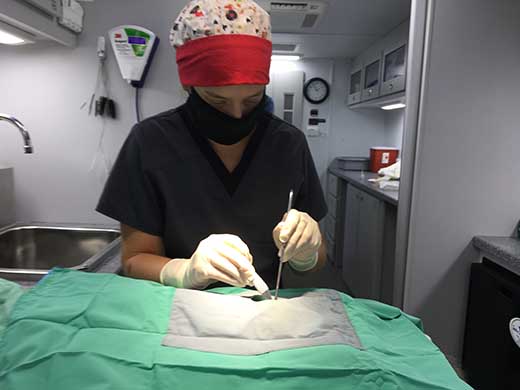Shelter medicine program performs its 25,000th surgical procedure in Wichita
Tuesday, Nov. 17, 2020

A fourth-year veterinary medicine student performs surgery on a stray animal in Kansas State University's Shelter Medicine Mobile Surgery Unit. The unit, which visits shelters and animal welfare organizations in a two-hour radius of Manhattan, recently performed its 25,000th spay/neuter procedure. The procedures are performed free of charge to the organizations. | Download this photo.
MANHATTAN — The numbers keep adding up and veterinary students continue to gain valuable, hands-on surgical experience with Kansas State University's Shelter Medicine Mobile Surgery Unit.
In October, the program recorded its 25,000th spay/neuter procedure on a patient named "Cat No. 3" from Willow Colony. Fourth-year veterinary medicine student Gemma Isermann, Rossville, performed the surgery while the unit was on location at Friends of Felines TNR, in Wichita.
Five years and five months since first hitting the road on its maiden trip May 9, 2015, the K-State Mobile Surgery Unit has been used to help dozens of animal shelters and community organizations save on veterinary care costs and has drawn attention to the plight of homeless animals.
The shelter medicine team consists of clinical sciences faculty members Brad Crauer and Cody Dressler, who are accompanied on each trip by three fourth-year veterinary students and a veterinary nurse, Kelsey Decker, who work together to spay and neuter unowned pets at an area shelter. Students spend two weeks on the mobile unit rotation, providing surgery and veterinary care at no cost to participating shelters.
The Mobile Surgery Unit has spent approximately 1,450 days and over 190,000 miles on the road over the last five years to reach the milestone of 25,000 surgeries. For each trip, students packed and loaded daily supplies in the 32-foot trailer, which sports the university's Powercat logo and wordmark, plus the slogan "Future Vets Helping Future Pets." The students use the up to two hours in travel time to reach participating shelters for classes and lectures to improve their knowledge of shelter medicine, procedures and the unique aspects of working with unowned animals.
Once the unit arrives at the shelter, the students perform surgeries under the guidance of Crauer, Dressler and Decker, who is a licensed veterinary nurse. They also tour the facilities and have consultations with shelter managers before returning home, only to start again the next day.
The Mobile Surgery Unit has regularly visited 26 animal-welfare organizations within a two-hour radius of Manhattan over the past five years. The experience exposes students to each shelters' unique processes and challenges, Crauer said. The shelters are in Clay Center, Emporia, Junction City, Lawrence, Louisburg, Manhattan, Ottawa, Salina and Topeka. The unit also travels to a shelter in Beatrice, Nebraska.
"By the end of the rotation, we hope the students have gained a greater knowledge and appreciation for shelter medicine and use that to make a difference in the communities they become a part of after graduation," Crauer said.
Students are not the only beneficiaries. Veterinary care, especially spays and neuters, make up a large portion of a shelter's operating expense. Since the students perform surgery at no cost, shelters are saving between $50-$175 per animal, a significant savings when considering the number of animals the shelters serve, Crauer said. Shelters also have the advantage of regular professional consultations from Crauer and the team.
The K-State Shelter Medicine Mobile Surgery is supported by private gifts and a grant from PetSmart Charities.
